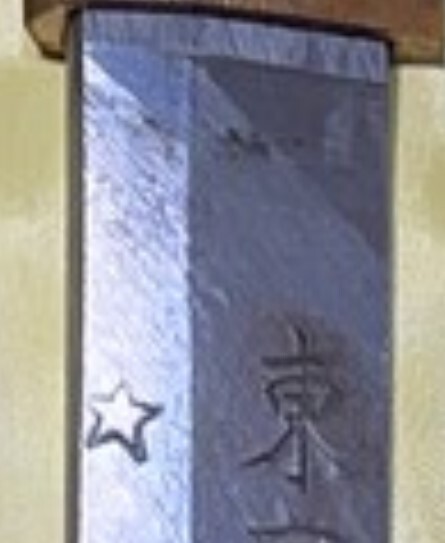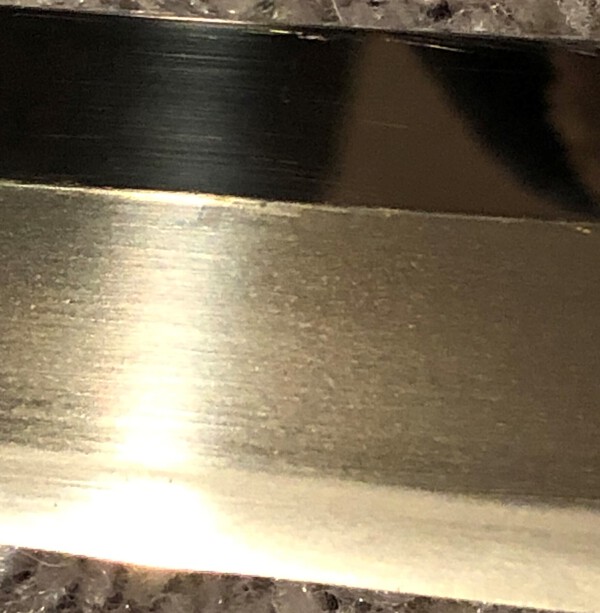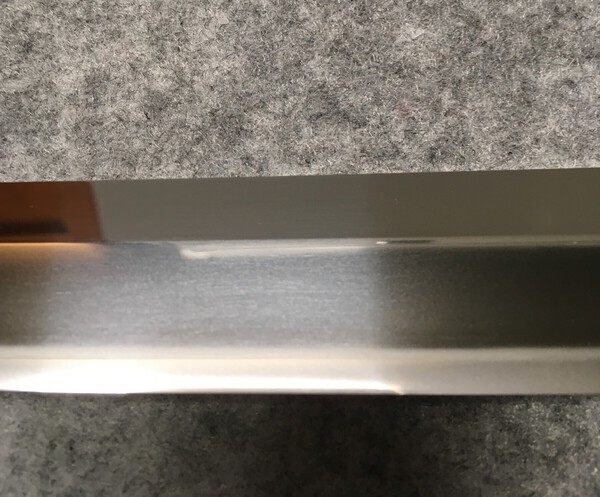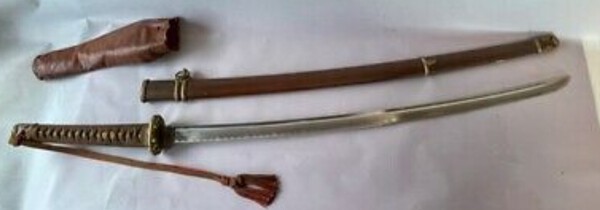-
Posts
14,114 -
Joined
-
Last visited
-
Days Won
169
Content Type
Profiles
Forums
Events
Store
Downloads
Gallery
Everything posted by Bruce Pennington
-

Arsenal Mark on RJT sword Fittings
Bruce Pennington replied to george trotter's topic in Military Swords of Japan
Ahhhh. A mind is a terrible thing to waste! 10 blades per month - 1 blade every 3 days! That's quite amazing for traditionally made blades, and that assumes no days off. -
Interesting similar discussion ON GUNBOARDS about black-painted Arisaka rifles. Most seem to be period paint, as a couple have ground-off mums that show the paint was there before the mum was ground off.
-

What In The Cornbread Hell Is This?
Bruce Pennington replied to jt nesbitt's topic in Military Swords of Japan
-

Arsenal Mark on RJT sword Fittings
Bruce Pennington replied to george trotter's topic in Military Swords of Japan
Thanks Thomas, that one shows the unusual stamp at the end of the nakago, but it doesn't show the "KO" stamp. I don't see it anyway. On the topic of weird stamps - what the heck?: -

Arsenal Mark on RJT sword Fittings
Bruce Pennington replied to george trotter's topic in Military Swords of Japan
Mal, I'm going through my Star-stamped files and the first one I found with Star and Ko is of Hidehiro. Slough says his "last known residence" was Okawa city, Sakami. My google search says that is in Fukuoka. Assuming he did his work there, that's nowhere near Tokyo. So I'm thinking my "collecting, packaging, and shipping to Tokyo" might be the answer to these inspection marks. But wait! (idea just hit me) - these blades are from 1942. We don't see Osaka, Nagoya, or other arsenal stamps show up until 1943 and 1944. Maybe the inspectors that traveled all over the country carried Tokyo Arsenal inspector stamps because they were from Tokyo! -

Arsenal Mark on RJT sword Fittings
Bruce Pennington replied to george trotter's topic in Military Swords of Japan
Mal, On your first Shigefusa, page 29, I can't see the Ko stamp. Do you have a more clear shot of it? Also, what is that at the bottom of the nakago? Is it a hotstamp? -

Arsenal Mark on RJT sword Fittings
Bruce Pennington replied to george trotter's topic in Military Swords of Japan
I wish I had a better memory. ... I read somewhere, recently, that Army RJT inspectors went around to the forges and collected blades, packaged them, and sent them to Tokyo for storage and distribution. Could this process account for the stamps on this blade? -

Difference between a 94 and 98
Bruce Pennington replied to ChrisAWilson's topic in Military Swords of Japan
@PNSSHOGUN is the best guy for your answer. I can tell you the second haikan (hanger) was removable and a great many of them were removed and/or lost. John can fill you in on the other differences (or other guys that follow the fittings closely). -

koa isshin mantetsu hada
Bruce Pennington replied to lonely panet's topic in Military Swords of Japan
I definitely see lines in the steel in this one Neil. Maybe it was at the end of their experimental work. -

koa isshin mantetsu hada
Bruce Pennington replied to lonely panet's topic in Military Swords of Japan
It's been a while since I read the history, but I remember the earliest ones were made a different way before they refined the production concepts. I want to say '37 was the experimental year and after that they got more standardized. But I'm talking from memory, which has often betrayed me with false info! Nice one Neil! -

Need help with identifying this sword
Bruce Pennington replied to John Barry's topic in Military Swords of Japan
There is a thread here at NMB where a guy found a supply and was hoping to get other guys to chip in to buy a roll. Might be able to search the site and find it. -
Jim, @mecox and I have been tracking these numbered blades. Thanks for the new one! Is that a stamp in the upper right corner? Any on the nakago mume?
-
Chiba .... now that’s interesting!
-
Ha! Go ahead, the pay is lousy! And I hate reading the fine print! So, it begs the question then - who put that blade in there and why?
-

koa isshin mantetsu hada
Bruce Pennington replied to lonely panet's topic in Military Swords of Japan
@IJASWORDS has this one for sale. Wartime polish, so tough to see hada, but you can make out a bit near the tip: -

koa isshin mantetsu hada
Bruce Pennington replied to lonely panet's topic in Military Swords of Japan
My toshigi said it resembles Nashiji, or pear. I don't think it's a crafted hada, but just the result of the nature of the local steel that Mantetsu used. But I'm not really knowledgeable of their steel making process, so there could be more workmanship involved than I'm stating. -

koa isshin mantetsu hada
Bruce Pennington replied to lonely panet's topic in Military Swords of Japan
-

koa isshin mantetsu hada
Bruce Pennington replied to lonely panet's topic in Military Swords of Japan
Here's mine: (hmm, a bit out of focus. Looks like the camera focused on the surface behind the blade. I'll try for a better shot) Interesting! You can actually see it in it's original condition: -
The one on fleabay seems to have a zoheito in it. This is quite an interesting development. They seem too well crafted for the average fake operation. And if a faker, why create a pattern that doesn't even try to emulate the IJA patterns (except for the tsuba)? Most fakes try to copy the military fittings. I don't know what we're looking at, but it doesn't seem faked.
-
John, I haven't seen the video you reference, but Ohmura has several pages on the Kamikaze operation: http://ohmura-study.net/310.html#2 In them, you will see all the photos of pilots wearing, and holding full-sized kaigunto. There is one photo I could find of them holding both the gunto and the "pilot knife." Here is his page on the "pilot knife": http://ohmura-study.net/767.html And pics of examples:
-

Need help with identifying this sword
Bruce Pennington replied to John Barry's topic in Military Swords of Japan
The numbers are believed to be put there by the shop that did the fittings. Since each piece is custom fit to each blade, they mark them all to keep them together during the process. By having all your pieces with the same number, it's nice to know they are all original parts and haven't been switched around by previous owners. Don't know if you are into restoration, but if so, the tassel would have gone on a metal or cloth "loop" on the end of the handle (tsuka). Yours has gone missing, and someone put the tassel on the belt hanger loop (haikan). I'm attaching some pics of various styles. -

Need help with identifying this sword
Bruce Pennington replied to John Barry's topic in Military Swords of Japan
Absolutely gorgeous fittings Barry! -

Help identify please. WW2 bring back?
Bruce Pennington replied to silverback52's topic in Military Swords of Japan
Ditto. The Damascus steel is the second clue. -

What In The Cornbread Hell Is This?
Bruce Pennington replied to jt nesbitt's topic in Military Swords of Japan





















